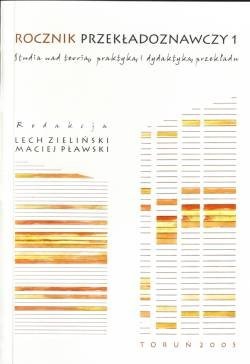Intertekstualne związki I części Fausta Goethego z filozofią i ich (nie)obecność w polskich przekładach
DOI:
https://doi.org/10.12775/RP.2005.003Słowa kluczowe
Goethe, Faust, intertekstualność, aluzja filozoficznaAbstrakt
The paper assumes that the translation of Faust I should show the connections between a literary work and its philosophical allusions. Philosophy and literature try to give an answer to the same questions: about the sense of the world, life and science, about nature, but they evaluate it differently. Throughout his lifetime Goethe gained acquaintance with the Bible and the classics, and he spent a lot of time studying philosophical works of Paracelsus, Johannes Kepler, Heinrich Agrippa von Nettesheim, Swedenborg, alchemy and natural magic. The marks of his philosophical interest are to be found in many fragments of his Faust. On the other hand Faust influenced philosophy, for example the philosophy of Hegel or Nietzsche. The fragments of Polish translations indicate to the influence of philosophy on the translation, too (for example in a translation of the term “Übermensch” – Super- Human). The description method is based of the search of intertextual connections between the work of Goethe and the philosophical texts. In the paper the old Polish translations (of Walicki, Bielowski, Krajewski) as well as the newest Polish versions of Faust (of Buras and Pomorski) have been presented. The paper assumes that this work represents the core of Goethe’s philosophical thought, which is the reason of difficulties in translating into the Polish language and culture.
Bibliografia
Literatura
Arystoteles, 1980, „Harmonia gwiazd”, [w:] O niebie, ks. II, R. IX, 291a, przeł. Paweł Siwek, Warszawa.
Aster, E., 1923, Goethes Faust, München–Leipzig.
Balcerzan, E., 1982, Kręgi wtajemniczenia. Czytelnik. Badacz. Tłumacz. Pisarz, Kraków.
Binder, A., 1993, »‘Es irrt der Mensch so lang er strebt’ . Der ‘Prolog im Himmel’ in Goethes ‘Faust’ als satirische Homodizee«, Goethe Jahrbuch 110, s. 242–260.
Cieślikowska, T., 1995, „Z problemów intertekstualności”, [w:] W kręgu genologii, intertekstualności, teorii sugestii, Warszawa.
Gaier, U., 1999, J. W. Goethes Faust-Dichtungen. Kommentar, Bd. 1–3, Stuttgart.
Garewicz, J., 1982, „O metaforze w filozofii: sowa Minerwy”, [w:] Wypowiedź literacka a wypowiedź filozoficzna, seria: Z Dziejów Form Artystycznych w Literaturze Polskiej, red. Janusz Sławiński, Michał Głowiński, Wrocław–Warszawa, s. 79–91.
Goethe – Handbuch, 1996, Hg. B. Witte, T. Buck, H.-D. Dahnke, Bd. 2 (Hg. von T. Buck), Stuttgart.
Głowiński, M., Kostkiewiczowa, T., Okopień-Sławińska, A., Sławiński, K., 2000, Słownik terminów literackich, wyd. 3 poszerzone i poprawione, Wrocław.
Haas, A. K., 2005, Polskie przekłady »Fausta I« Goethego. Próba krytyki i zarys recepcji w Polsce, Gdańsk.
Hegel, G. F. W., 1964, Wykłady z estetyki, t. 3, tłum. J. Grabowski, A. Landman, Warszawa.
Hegel, G. F. W., 1993, Vorlesungen über die Ästhetik, Bd. III, Auf der Grundlage der Werke von 1832–1845 neu ed. Ausg. Hg. von Eva Moldenhauer u. Karl Markus Michel, Bd. 15. 3. Aufl., Frankfurt/M.
Kant, I., 2004, Kritik der reinen Vernun. Kritik der praktischen Vernun. Kritik der Urteilskra , Ungekürzte Sonderausgabe zum Kantjahr, Wiesbaden.
Kepler, J., 1990, „Harmonices of the World”, [w:] Great Books of the Western World, ed. by Mortimer J. Adler, vol. 15: Ptolemy. Copernicus. Kepler, Chicago.
Kołakowski, L., 1957, Światopogląd i życie codzienne, Warszawa
Nycz, N., 2000, Tekstowy świat. Poststrukturalizm a wiedza o literaturze, wyd. 2, Kraków. Paracelsus, P. T. B., 1999, Astronomia Magna oder die ganze Philosophia sagax der großen und kleinen Welt, Hg. von N. Winkle, Frankfurt/M.
Przełęcki, M., 1982, „Wartość poznawcza wypowiedzi literackich i filozoficznych”, [w:] Wypowiedź literacka a wypowiedź filozoficzna, seria: Z Dziejów Form Artystycznych w Literaturze Polskiej, red. M. Głowiński, J. Sławiński, Wrocław–Warszawa, s. 9–25.
Schöne, A., 1999, „Kommentare”, [w:] Johann Wolfgang Goethe, Faust, Bd. 2, Frankfurt/M.
Szturc, W., 1995, Faust Goethego. Ku antropologii romantycznej, Kraków.
Witte, B., Buck, T., Dahnke, H.-D. (Hg.), 1996, Goethe – Handbuch, Bd. 2, Stuttgart.
Wybrane przekłady I cz. Fausta J. W. Goethego: Prolog w Niebie, przekład Augusta Bielowskiego, „Tygodnik Literacki”, Poznań 1839, wyd. 2, s. 11.
Faust, przeł. J. St. Buras, Kraków: Wydawnictwo Literackie 1997.
Faust, przeł. Aleksander Krajewski, „Biblioteka Warszawska”, Warszawa 1857 (wyd. 2: Lwów 1883, wyd. 3: Warszawa 1921).
Faust, przeł. Ludwik Jenike, Złoczów 1926 (wcześniejsze wydania: 1887, 1889, 1891).
Faust, cz. I i II, przeł. Felix Jezierski, Warszawa: S. Lewental 1880.
Faust, cz. I i II, przeł. Józef Paszkowski, Kraków: Gebethner i Sp. 1883 (wyd. 1: b.m. 1841).
Faust. Tragedia, cz. 1, przeł. Feliks Konopka, Wrocław: Siedmioróg 1999 (wyd. 1: 1962).
Faust, przeł. Adam Pomorski, Warszawa: Świat Książki 1999.
Faust, Tragedii część pierwsza, przeł. Artur Sandauer, Kraków: Wydawnictwo Literackie 1987.
Faust, przeł. Alfons Walicki, [w:], Arcydzieła dramatyczne w przekładzie Józefa Korzeniowskiego i Alfonsa Walickiego, Wilno 1844.
Pobrania
Opublikowane
Numer
Dział
Statystyki
Liczba wyświetleń i pobrań: 946
Liczba cytowań: 0



